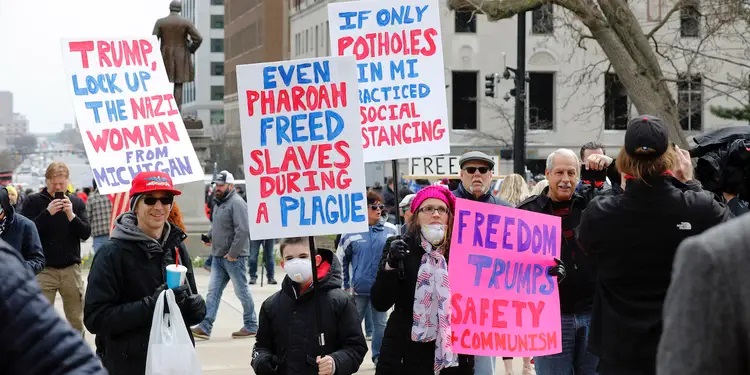April 30, 2020
Earlier this month, three Kentucky pastors filed a lawsuit against a statewide lockdown to limit the spread of COVID-19 — citing Fred Korematsu’s Supreme Court case to paint the order as part of a long history of “egregious violations of fundamental rights” during “times of public panic and fear.” They’re not the only ones. Just last week, the hyper-conservative One America News Network declared stay-at-home orders “the greatest attack on individual liberty in this republic since the Korematsu decision.” Pundits and anti-lockdown protestors around the country have likened life under quarantine to Japanese American incarceration, Jim Crow laws, and even slavery.
One especially, uh, tenacious columnist compared people self-isolating at home to “inmates in jail,” Japanese Americans “willingly lined up to go to camp,” and, at one point, the handmaidens in Margaret Atwood’s The Handmaid’s Tale.
We can’t believe this actually needs to be said, but… staying home during a global pandemic is not the same thing as being incarcerated and stripped of basic civil rights. Your living room is not a concentration camp, and exposing service providers to hazardous working conditions so you can get a haircut is not an inalienable right. Your sense of entitlement and lack of any lived or historical knowledge of real systemic oppression makes you a whiny, privileged brat who can’t distinguish between inconvenience and state violence—not a freedom fighter.
Sit down, stay home, and stop calling yourself a modern day Fred Korematsu or Rosa Parks.
The people now protesting the “tyranny” of personal hygiene and closed golf courses are the same people who have enthusiastically supported the Muslim Ban, the detention and deportation of undocumented immigrants, the ever-expanding system of mass incarceration, and other examples of actual injustice. It’s a grim irony, then, that they appropriate the historic struggles of communities of color when they have spent so much time and energy denying that these inequities persist today.
Make no mistake — these people don’t care about civil rights, let alone the rights of people of color, immigrants, workers, or other groups who are truly vulnerable during these difficult times. They care about upholding a status quo where people with power and privilege are free to do whatever they want, whenever they want, without regard for how their actions impact everyone else.
So instead of wasting any more energy on the imaginary persecution of bored and angry white folks, here are a few things all of us can do to truly help each other through this crisis:
1. Get involved in local mutual aid efforts, and donate money, food, masks, translation services, or any other goods or services you’re able to offer.
2. Urge ICE and elected officials to release people who are facing deadly conditions inside *actual prisons* and #FreeThemAll
3. Demand that undocumented immigrants are included in COVID-19 relief funds, and if you’re able to, consider donating a portion of your federal stimulus check to an undocumented worker relief fund.
- Tell Congress: Deliver a COVID-19 Health and Stimulus Bill that Protects Immigrant Families
- Tell Gov. Inslee to Support a Washington Worker Relief Fund
- COVID-19 Relief Fund for Undocumented Individuals in Washington State (Washington Dream Coalition)
- Relief Funds for Undocumented Workers in California (Legal Aid at Work)
4. Support the small businesses in your community — especially the POC and immigrant-owned businesses hit hardest by the pandemic — by doing online shopping, purchasing gift cards, ordering take-out, or donating flowers or a meal to frontline workers and low-income residents.
- #LoveLT – Support Little Tokyo During COVID-19
- Support the ID – Community United
- Solidarity Flowers (Khmer Community of Seattle King County)
- COVID-19 Takeout and Delivery Directory (Intentionalist)
5. Support the frontline workers who are literally risking their lives to provide goods and services to the rest of us, and push companies like Amazon, Walmart, Target, Whole Foods, and Instacart to meet workers’ demands for safer conditions.
6. Use this time to dive deeper into lessons of resilience, resistance and community from our history.
- 5 Ways to Learn Japanese American History from the Comfort of Your Home
- Student Views of Life in a Japanese American Concentration Camp
- Unmasking Yellow Peril (18 Million Rising)
—
By Densho Communications Coordinator Nina Wallace
[Header photo: Anti-lockdown protestors outside the Michigan State Capitol, carrying signs comparing stay-at-home orders to slavery and the Holocaust. April 15, 2020. Photo by Jeff Kowalsky/Getty Images.]
